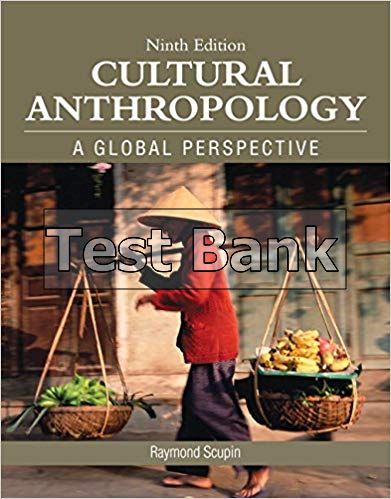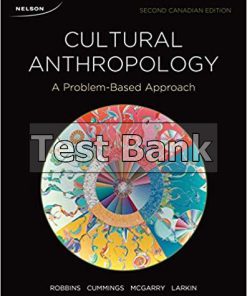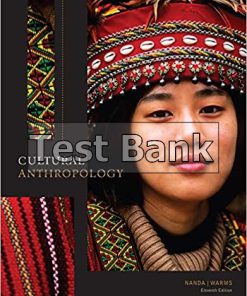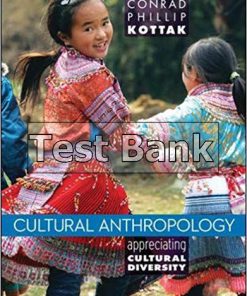Cultural Anthropology 9th Edition Scupin Test Bank
You may also like
Cultural Anthropology 9th Edition Scupin Test Bank

Product details:
- ISBN-10 : 0134008979
- ISBN-13 : 978-0134008974
- Author: Raymond Scupin
For courses in Introduction to Cultural Anthropology Connect with the World Around Us Through Cultural Anthropology Introduction to Cultural Anthropology: A Global Perspective acquaints readers with the cultural discipline of anthropological studies. The text recognizes that in the nature of our 21st century world, humans need a much greater capacity for understanding different cultures than ever before.
Table contents:
Chapter 1: The Anthropological Perspective
What is Anthropology?
What Is the Concept of Culture?
What Makes Anthropology a Cross-Disciplinary Discipline?
Biological Anthropology
Cultural Anthropology
Linguistic Anthropology
Archaeology
Part I: The Tools of Cultural Anthropology
Chapter 2: Why Is the Concept of Culture Important?
How Do Anthropologists Define Culture?
Culture, History, and Human Agency
Why Do Cultural Differences Matter?
-What Is Ethnocentrism?
-Is It Possible to Avoid Ethnocentric Bias?
-What Is Cultural Relativism?
How Can Cultural Relativity Improve Our Understanding of Controversial Cultural Practices?
-Genital Cutting, Gender, and Human Rights
-Genital Cutting as a Valued Ritual
-Culture and Moral Reasoning
-Did Their Culture Make Them Do It?
Does Culture Explain Everything?
-Culture Change and Cultural Authenticity
The Promise of the Anthropological Perspective
Chapter 3: What Is Ethnographic Fieldwork?
Why Do Fieldwork?
What is the Fieldwork Experience Like?
-A Meeting of Cultural Traditions
Ethnographic Fieldwork: How Has Anthropologists’ Understanding Changed?
-The Positivist Approach
-Was There a Problem with Positivism?
-Can the Reflexive Approach Replace Positivism?
-Can Fieldwork Be Multisited?
What Is the Dialectic of Fieldwork?
-How Are Interpretation and Translation Important Aspects of Fieldwork?
-How Can Anthropologists Move Beyond the Dialectic?
-The Dialectic of Fieldwork: Some Examples
-What Happens When There Are Ruptures in Communication?
What Are the Effects of Fieldwork?
-How Does Fieldwork Affect Informants?
-How Does Fieldwork Affect the Researcher?
-Does Fieldwork Have Humanizing Effects?
Where Does Anthropological Knowledge Come From?
How Does Knowledge Produce?
Is Anthropological Knowledge Open-Ended?
Chapter 4: How Has Anthropological Thinking about Cultural Diversity Changed Over Time?
Capitalism, Colonialism, and the Origins of Ethnography
-Capitalism and Colonialism
-The Fur Trade in North America
-The Slave and Commodities Trades
-Colonialism and Modernity
-The Colonial Political Economy
Anthropology and the Colonial Encounter
What Explains Human Cultural Variation?
-Evolutionary Typologies: The Nineteenth Century
-Unilineal Cultural Evolutionism
-Social Structural Typologies: The British Emphasis
-Origins in the Colonial Setting
-The Classification of Political Structures
-Structural-Functional Theory
-Doing without Typologies: Culture Area Studies in America
-The Biology of Human Variation
-How Do Anthropologists Study Forms of Human Society Today?
-Postcolonial Realities
-Locating Cultural Processes in History
-Analyzing Cultural Processes Under Globalization
-The Anthropology of Science, Technology and Medicine
Part II: The Resources of Culture
Chapter 5: What is Human Language?
Why Do Anthropologists Study Language?
-Language and Culture
-Talking about Experience
What Makes Human Language Distinctive?
What Does It Mean to “Learn” a Language?
-Language and Context
Does Language Affect How We See the World?
What Are the Components of Language?
-Phonology: Sounds
-Morphology: Word Structure
-Syntax: Sentence Structure
-Semantics: Meaning
-Pragmatics: Language in Contexts of Use
-Ethnopragmatics
What Happens When Languages Come into Contact?
-What is the Relation of Pidgins and Creoles?
-How is Meaning Negotiated in Pidgins and Creoles?
What Does Linguistic Inequality Look Like?
-What Are the Controversies Surrounding the Language Habits of African Americans?
-What Is Language Ideology?
-What Are the Controversies Surrounding the Language Habits of Women and Men?
What Is Lost if a Language Dies?
How Are Language and Truth Connected?
Chapter 6: How Do We Make Meaning?
What Is Play?
-How Do We Think about Play?
-What Are Some Effects of Play?
Do People Play by the Rules?
-How Are Culture and Sport Related?
-How Is Sport in the Nation-State Organized?
-Sport as Metaphor
-How Are Baseball and Masculinity Connected in Cuba?
What Is Art?
Can Art Be Defined?
-“But Is It Art?”
-“She’s Fake”: Art and Authenticity
-How Does Hip-Hop Become Japanese?
-How Does Sculpture Figure the Baule Gbagba Dance?
-The Mass Media: A Television Serial in Egypt
What Is Myth?
-How Does Myth Reflect-and Shape-Society?
-Do Myths Help Us Think?
What is Ritual?
-How Do Anthropologists Define Ritual?
-What Makes a Child’s Birthday Party a Ritual?
-How is Ritual Expressed in Action?
-What Are Rites of Passage?
-How Are Play and Ritual Complementary?
How Do Cultural Practices Combine Play, Art, Myth, and Ritual?
Chapter 7: What Can Anthropology Tell Us about Religion and Worldview?
What Is a Worldview?
How Do Anthropologists Study Worldviews?
What Are Some Key Metaphors for Constructing Worldviews?
What Is Religion?
-How Do People Communicate in Religion?
-How Are Religion and Social Organization Related?
Worldviews in Practice: Two Case Studies
-Coping with Misfortune: Witchcraft, Oracles, and Magic among the Azande
-Azande Witchcraft Beliefs
-Dealing with Witches
-Are There Patterns of Witchcraft Accusation?
-Coping with Misfortune: Listening for God among Contemporary Evangelicals in the U. S.
Maintaining and Changing a Worldview
-How Do People Cope with Change?
-The Bwiti Religion
-Kwaio Religion
How Are Worldviews Used as Instruments of Power?
Is Secularism a Worldview?
-Religion and Secularism
-Muslim Headscarves in France: A Case Study
Part III: The Organization of Material Life
Chapter 8: How Are Culture and Power Connected?
Who Has the Power to Act?
How Do Anthropologists Study Politics?
-What Is Coercion?
-Coercion in Societies without States?
-Domination and Hegemony
-Power and National Identity: A Case Study
-Biopower and Governmentality
-Trying to Elude Governmentality: A Case Study
-The Ambiguity of Power
How Can Power Be an Independent Entity?
What Is the Power of the Imagination?
-The Power of the Weak
-What Does it Mean to Bargain for Reality?
-Bargaining over Marriage in Morocco
-Peasant Resistance in Malaysia
How Does History Become a Prototype of and for Political Action?
How Can the Meaning of History Be Negotiated?
Chapter 9: How Do People Make a Living?
What Are Subsistence Strategies?
What Are the Connections between Culture and Livelihood?
-Self-Interest, Institutions, and Morals
What Are Production, Distribution, and Consumption?
How Are Goods Distributed and Exchanged?
-Capitalism and Neoclassical Economics
-Modes of Exchange
Does Production Drive Economic Activities?
-Labor
-Modes of Production
-The Role of Conflict in Material Life
-Applying Production Theory to Social and Cultural Life
Why Do People Consume What They Do?
-The Internal Explanation: Malinowski and Basic Human Needs
-The External Explanation: Cultural Ecology
-Food Storage and Sharing
How Does Culture Construct Human Needs?
-What Is the Original Affluent Society?
-The Abominations of Leviticus
-Banana Leaves in the Trobriand Islands
How Does Culture Construct Utility?
-Consumption Studies Today
-Coca-Cola in Trinidad
What Is the Anthropology of Food and Nutrition?
Interplay between the Meaningful and the Material
Part IV: Systems of Relationships
Chapter 10: Where Do Our Relatives Come From and Why Do They Matter?
How Do Human Beings Organize Interdependence?
What Is Friendship?
-American College Student Friendship and Friendliness
What Is Kinship?
-Sex, Gender, and Kinship
-How Many Sexes Are There?
-Understanding Different Kinship Systems
What Is the Role of Descent in Kinship?
-Bilateral Kindreds
-Unilineal Descent Groups
What Role Do Lineages Play in Descent?
-Lineage Membership
-The Logic of Lineage Relationships
-Patrilineages
-Matrilineages
-Matrilineality, Electoral Politics, and the Art of the Neutral Partisan
What Are Kinship Terminologies?
-Criteria for Distinguishing Kin
What Is Adoption?
-Adoption in Highland Ecuador
How Flexible Can Relatedness Be?
-Negotiation of Kin Ties among the Ju/’hoansi
-I�upiaq Relatedness
-European American Kinship and New Reproductive Technologies
-Compadrazgo in Latin America
How Can Practices of Relatedness Produce Unexpected Outcomes?
-Conflicting Obligations among the Iteso
-Assisted Reproduction in Israel
-Organ Transplantation and the Creation of New Relatives
What Are Sodalities?
-Secret Societies in Western Africa
-Membership and Initiation
-Use of the Kinship Idiom
-The Thoma Secret Society: A Microcosm
-The Meaning of Secrecy in a Secret Society
The Dimensions of Group Life
Chapter 11: Why Do People Get Married and Have Families?
How Do Anthropologists Define Marriage?
-Woman Marriage and Ghost Marriage among the Nuer
Marriage as a Social Process
-Patterns of Residence after Marriage
-Single and Plural Spouses
-Monogamy
-Polygyny
-Polyandry
Polyandry, Sexuality, and the Reproductive Capacity of Women
-Fraternal Polyandry
-Associated Polyandry
-Secondary Marriage
-The Distinction between Sexuality and Reproductive Capacity
What Is the Connection between Marriage and Economic Exchange?
Brothers and Sisters in Cross-Cultural Perspective
-Brothers and Sisters in a Matrilineal Society
-Brothers and Sisters in a Patrilineal Society
How Do Anthropologists Think about Family Structure?
-The Family Defined
-The Nuclear Family
-The Polygynous Family
-Competition in the Polygynous Family
-Extended and Joint Families
How Do Families Change over Time?
-Divorce and Remarriage
-Divorce in Guider
-Grounds for Divorce
-Separation among Inuit
-Blended Families
-Breaking Up Complex Households
-International Migration and the Family
-Families by Choice
The Flexibility of Marriage
How Do Sexual Practices Differ?
-Heterosexual Practices
-Other Sexual Practices
-Female Sexual Practices in Mombasa
-Male Sexual Practices in Nicaragua
-Love, Marriage, and HIV/AIDS in Nigeria
Sexuality and Power
Chapter 12: What Can Anthropology Tell Us about Social Inequality?
Gender
Class
Caste
-Caste in India
-Caste Struggle in Contemporary India
-Caste in Western Africa
-The Value of Caste as an Analytic Category
Race
-Race as a Social Category
-Race in Colonial Oaxaca
-Mobility in the Casta System
-Colorism in Nicaragua
Ethnicity
-Ethnicity in Urban Africa
-Ethnicity and Race
Nation and Nation-State
-Nationalities and Nationalism
-Australian Nationalism
-Naturalizing Discourses
-The Paradox of Essentialized Identities
-Nation-Building in a Postcolonial World: Fiji
-Nationalism and Its Dangers
Chapter 13: How is Anthropology Applied in the Field of Medicine?
What Is Medical Anthropology?
What Makes Medical Anthropology “Biocultural”?
How do people with different cultures understand the causes of sickness and health?
-Kinds of Selves
-Decentered selves on the Internet
-Self and Subjectivity
-Subjectivity, Trauma and Structural Violence
How are human sickness and health shaped by the global capitalist economy?
-Health, human reproduction and global capitalism
-The future of medical anthropology
Chapter 14: What Can Anthropology Tell Us about Globalization?
How Does Globalization Affect the Nation-State?
-Are Global Flows Undermining Nation-States?
-Migration, Transborder Identities, and Long-Distance Nationalism
-Anthropology and Multicultural Politics in the New Europe
-Flexible Citizenship
-The Postnational Ethos
Are Human Rights Universal?
-Human Rights Discourse as the Global Language of Social Justice
-Rights versus Culture
-Rights to Culture
-Rights as Culture
How Can Culture Help in Thinking about Rights?
-Violence against Women in Hawaii
-Child Prostitution in Thailand
Cultural Imperialism or Cultural Hybridity?
-Cultural Imperialism
-Cultural Hybridity
-The Limits of Cultural Hybridity
Can We Be at Home in a Global World?
-Cosmopolitanism
-Friction
-Border Thinking
Why Study Anthropology?
Bibliography
Credits
Glossary
Index
People also search:
cultural anthropology chapter 9 quizlet
cultural anthropology 19th edition
cultural anthropology concepts
cultural anthropology 8th edition
cultural anthropology history












